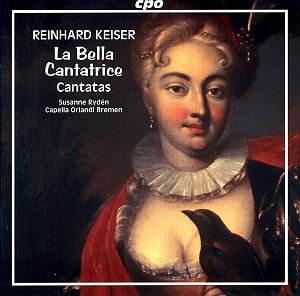Reinhard Keiser is
best known as the resident composer
at the opera house in Hamburg whilst
the young Georg Frideric Handel played
in the orchestra. Keiser produced a
series of operas tailored to the Hamburg
taste – polyglot operas (Italian and
German) with short melodic arias. Keiser
transferred these virtues to his cantatas;
not surprisingly given that in the preface
to a publication of 1698 he stated his
view that a cantata was simply an operatic
scene, reduced to a single person.
The cantatas on this
disc come from three collections. ‘Divertimenti
serenissimi’ was published in Hamburg
in 1713 and consists of settings of
Italian texts. The work was dedicated
to Countess Maria Aurora von Königsmarck,
herself a noted writer of operatic libretti.
The second collection, ‘Muskalisches
Land-Lust’ was published in Hamburg
in 1714 and sets German texts by Menantes,
the nom-de-plume of C.F.Hunold. The
texts were written at the height of
the poet Sturm und Drang period,
but at the time of the cantatas’ publication
he had retired into a position as professor
of law. The cantatas in this collection
were dedicated, as a wedding present,
to the scions of one of the great Hamburg
mercantile families. The other source
of cantatas on the present disc is another
group of miscellaneous Italian cantatas
preserved in manuscript form in the
Berlin State Library.
The disc opens with
‘Salvate il mio sposo’ (Save my spouse)
a simple da capo aria with an extremely
haunting melody in which a woman prays
to the Gods for the life of her spouse.
This is followed by ‘La bella cantatrice’
(The fair songstress), a long sequence
of recitative and arias in which a highly
self-regarding artiste describes the
effects that her powers have on her
audience. ‘Il gelosso sprezzante’ (Disdainful
jealousy) consists of a pair of recitatives
and arias in which the protagonist bemoans
that she is fated to be jealous.
The next item moves
from Italian to German. ‘Von dem Landleben’
(Of Country Life’) opens with a charmingly
melodic arietta describing country life,
this is expanded in a long recitative
followed by a final pair of arias. In
‘Über den 62. Psalm’ (On the 62nd
Psalm) a pair of arias separated by
a recitative describes the feelings
of the poet meditating on the Psalm.
‘Von Music’ (On Music) is a long meditation
on the power of music.
The final two cantatas
return to Italian. In ‘Non sa dire l’alma
mi’ (My soul cannot say), the singer
describes the pangs of burgeoning love.
‘Qual nova crudeltate’ (What new cruelty)
berates the poet’s lover for her continuing
cruelty. This last item is the only
one where Keiser did actually recycle
an existing operatic scene (from his
1703 opera ‘Claudius’)
The soloist in all
the cantatas is the Swedish soprano,
Suzanne Ryden. She has a pleasant, bright,
clear, focused voice with a nice line
in flexible ornament. Her ability to
sing beautifully placed, long, quiet
high notes is most welcome and her plangent
tones make her very suitable in this
repertoire and she shows this off stunningly
in the lovely opening aria of ‘Non sa
dire l’alma mia’. But without vibrato
there are occasional moments when her
shading of notes sounds perilously like
singing under the note. This music requires
a singer of virtuoso capabilities and,
by and large, she fulfils these requirements
admirably. Though, after listening to
an entire disc I did wish that she had
projected the text a little more and
had been susceptible to the changing
mood (affekt) of the various movements.
She is ably supported
by Capella Orlandi Bremen. The group
make real chamber music, one never feels
short changed that these are cut down
operatic movements. The group’s continuo
group produces some wonderfully varied
timbres from their different combinations
of organ, harp and theorbo.
For those interested
in baroque music of the period, this
is a lovely disc. But these lovely pieces
should have a wider audience and this
is just the disc to help provide it.
Robert Hugill


